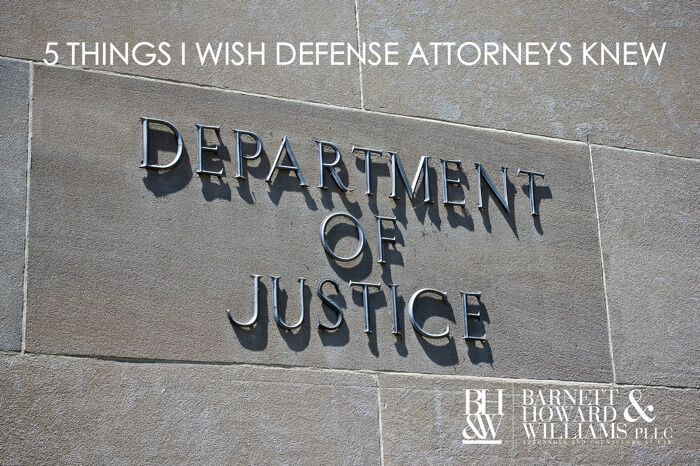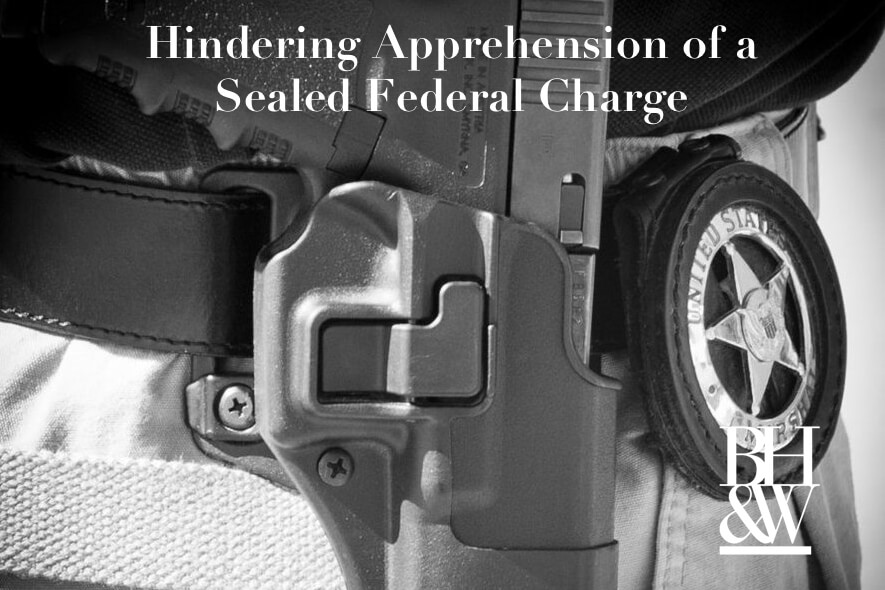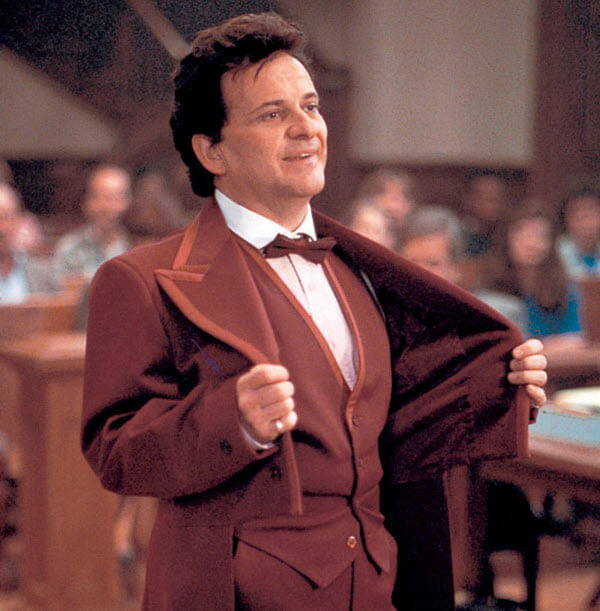
Former Federal Prosecutor’s Top Tips for Defense Attorneys
Former Assistant United States Attorney and long-time U.S. Marine prosecutor Glen Hines provides some tips regarding Federal criminal cases from his time as an AUSA in Arkansas. The views contained in this post are his own and not those of the Department of Justice, the United States Marine Corps or any other government organization.
Below are the top five unsolicited practice points for defense attorneys practicing in the Federal justice system:
Read up on the U.S. Attorneys’ Manual.
Although this is non-binding guidance to AUSAs, they rarely deviate from it. Be aware of the Principles of Federal Prosecution, at Section 9-27.000, because you can use these to get your client a better outcome in some cases. This will give you a good idea of DOJ policy on issues like charging decisions, non-criminal alternatives to prosecution, plea agreements and their provisions, and cooperation issues. These policies form the AUSA’s mindset to any federal case. If the AUSA on your case deviates from the USAM to the detriment of your client, ask him or her why they are doing it.
Get out ahead of the government’s case.
This is easier said than done in practice; unfortunately, by the time most of your clients get around to retaining you, they have likely already been indicted. But in the rare event one hires you beforehand, it’s an opportunity for you to shape the case before it even gets started. Don’t be afraid to proffer your client. If you think he has something to offer the government that might help them get a bigger fish, most offices have a standard use immunity agreement to cover whatever your client tells them during the proffer. Moreover, as stated above, if you can get in touch with the AUSA on your case, you might be able to obtain a non-criminal alternative to prosecution; for instance in financial cases you could offer the government that your client agree to a civil, financial forfeiture and “pretrial diversion” (Section 9-22.000) in lieu of indictment.
Know the Federal Sentencing Guidelines.
They drive everything. For some reason, a lot of defense attorneys avoid federal cases because they are afraid of having to deal with the guidelines, but it really isn’t rocket science. This is very important because almost every case I did as an AUSA, I pulled up the guidelines first to see what the case was going to be worth, the idea being, why should the government spend the resources to indict a case if the punishment was going to be very minimal? Know generally how to calculate the range, know about enhancements and deductions, and especially know that your client gets 3 points off the applicable range for timely pleading and “acceptance of responsibility.” See section 3E1.1. Your client is going to want to know how much time he is going to have to do if he pleads as opposed to going to trial and getting convicted, so you need to be able to calculate that number. A helpful calculator (not affiliated with any governmental entity) is on the internet HERE. Always check your numbers against what the AUSA comes up with.
“The squeaky wheel gets the grease”/Return my phone calls.
This goes along with #2 above. The defense attorney who calls or emails me about his case will get their call or email returned. If I know you are paying attention to your client’s case and hearing from you, it’s more likely I will view you as a straight-shooter and try to work with you on a potential deal. If I never hear from you and you never return my calls or emails, I will assume you want to go to trial and I’ll start preparing to do so.
The AUSA is not going to deal your case out at the last minute.
Do not turn down a plea offer because you think the AUSA is going to knuckle under at the last minute and give you a sweetheart deal as the jury is walking in for voir dire. I know this happens on the state level, but as said before, the AUSA does not have the discretion to fashion some kind of sentence deal; the guidelines drive sentencing. If you wait that long, expect to go to trial. AUSAs typically don’t have the huge caseload state deputy district attorneys do, so they try fewer cases and are only more than willing to roll the case out to the jury when the time comes.
 Glen. R. Hines (LinkedIn) is a former Assistant U.S. Attorney and a reserve Marine Corps Lieutenant Colonel and judge advocate. The majority of his 18-year, active-duty and reserve military career has been served as a prosecutor and Military Judge. He is a graduate of George Washington University (LLM-Highest Honors) and the University of Arkansas, Fayetteville (JD). He has written on national security, federal and military criminal law, and gun control issues. See his past article at Task & Purpose.
Glen. R. Hines (LinkedIn) is a former Assistant U.S. Attorney and a reserve Marine Corps Lieutenant Colonel and judge advocate. The majority of his 18-year, active-duty and reserve military career has been served as a prosecutor and Military Judge. He is a graduate of George Washington University (LLM-Highest Honors) and the University of Arkansas, Fayetteville (JD). He has written on national security, federal and military criminal law, and gun control issues. See his past article at Task & Purpose.




 Keiona Nowlin and her boyfriend, Demarcus Degrate, were riding in a car when a United States Marshal, executing a sealed, federal warrant on the boyfriend, pulled up behind them. After the Marshal activated the siren and lights, the couple pulled over and Degrate fled on foot. The Marshal chased Degrate. Moments later, as two Marshals arrived at the scene, they observed Nowlin screaming, “Run baby run…get away” while she also fled on foot. The Marshals detained Nowlin “to find out why she was running.” At that point, Nowlin fled the Marshals’ car. Nowlin was placed under arrest for escape.
Keiona Nowlin and her boyfriend, Demarcus Degrate, were riding in a car when a United States Marshal, executing a sealed, federal warrant on the boyfriend, pulled up behind them. After the Marshal activated the siren and lights, the couple pulled over and Degrate fled on foot. The Marshal chased Degrate. Moments later, as two Marshals arrived at the scene, they observed Nowlin screaming, “Run baby run…get away” while she also fled on foot. The Marshals detained Nowlin “to find out why she was running.” At that point, Nowlin fled the Marshals’ car. Nowlin was placed under arrest for escape.
 Criminal law disfavors the testimony of an accomplice, for good reason. The policy behind this is clear – factfinders should be leary of trusting those who have a substantial stake in the litigation, especially those with a direct liberty interest. A few years back, the 2nd District Court of Appeals (Fort Worth) provided a good synopsis of the Accomplice Witness Rule, which I felt was worth sharing. The following excerpt is taken from
Criminal law disfavors the testimony of an accomplice, for good reason. The policy behind this is clear – factfinders should be leary of trusting those who have a substantial stake in the litigation, especially those with a direct liberty interest. A few years back, the 2nd District Court of Appeals (Fort Worth) provided a good synopsis of the Accomplice Witness Rule, which I felt was worth sharing. The following excerpt is taken from 
 When I think of someone impersonating an attorney, my mind goes to Joe Pesci and My Cousin Vinny. In the movie Vincent Gambino only impersonated a criminal defense lawyer (not a public servant) so nobody seemed to care (except the judge), but in Texas, Impersonating Public Servant (including a district attorney) is a serious matter. Robert Cornwell found this out after he pretended to be a Dallas County Assistant District Attorney in hopes of helping his friend with a DWI case.
When I think of someone impersonating an attorney, my mind goes to Joe Pesci and My Cousin Vinny. In the movie Vincent Gambino only impersonated a criminal defense lawyer (not a public servant) so nobody seemed to care (except the judge), but in Texas, Impersonating Public Servant (including a district attorney) is a serious matter. Robert Cornwell found this out after he pretended to be a Dallas County Assistant District Attorney in hopes of helping his friend with a DWI case.



 Every criminal allegation exists in a gray area. If one were to focus solely on the police report, a criminal case might seem black and white. But it’s not. There are secrets, personalities, motivations, half-truths, unnamed witnesses, and much more lurking in the shadows of every case. One of the keys to a successful defense is to uncover those facts not articulated in the police report and give the case a context. This is why we use a private investigator as part of our defense team.
Every criminal allegation exists in a gray area. If one were to focus solely on the police report, a criminal case might seem black and white. But it’s not. There are secrets, personalities, motivations, half-truths, unnamed witnesses, and much more lurking in the shadows of every case. One of the keys to a successful defense is to uncover those facts not articulated in the police report and give the case a context. This is why we use a private investigator as part of our defense team.





